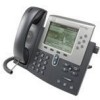Cisco 7962G Administration Guide - Page 125
ettings > Security, Configuration > 802.1X Authentication, TFTP server or Cisco Unified
 |
UPC - 882658140341
View all Cisco 7962G manuals
Add to My Manuals
Save this manual to your list of manuals |
Page 125 highlights
Chapter 7 Viewing Model Information, Status, and Statistics on the Cisco Unified IP Phone Status Menu Table 7-2 Status Messages on the Cisco Unified IP Phone (continued) Message DHCP timeout Disabled DNS timeout DNS unknown host Duplicate IP Description Possible Explanation and Action DHCP server did not respond. • Network is busy-The errors should resolve themselves when the network load reduces. • No network connectivity between the DHCP server and the phone-Verify the network connections. • DHCP server is down-Check configuration of DHCP server. • Errors persist-Consider assigning a static IP address. See the "Network Configuration Menu" section on page 4-5 for details on assigning a static IP address. 802.1X Authentication is disabled on the phone. You can enable 802.1X using the Settings > Security Configuration > 802.1X Authentication option on the phone. For more information, see the "802.1X Authentication and Status" section on page 4-29. DNS server did not respond. • Network is busy-The errors should resolve themselves when the network load reduces. • No network connectivity between the DNS server and the phone-Verify the network connections. • DNS server is down-Check configuration of DNS server. DNS could not resolve the name of the TFTP server or Cisco Unified Communications Manager. • Verify that the host names of the TFTP server or Cisco Unified Communications Manager are configured properly in DNS. • Consider using IP addresses rather than host names. Another device is using the IP address assigned to the phone. • If the phone has a static IP address, verify that you have not assigned a duplicate IP address. See the "Network Configuration Menu" section on page 4-5 section for details. • If you are using DHCP, check the DHCP server configuration. OL-14625-01 Cisco Unified IP Phone 7962G and 7942G Administration Guide for Cisco Unified Communications Manager 6.1 7-5















